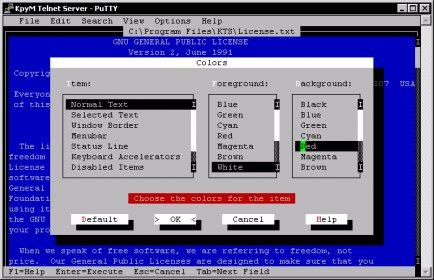

- #FREE TELNET SERVER HOW TO#
- #FREE TELNET SERVER INSTALL#
- #FREE TELNET SERVER FULL#
- #FREE TELNET SERVER REGISTRATION#
OpenSSH for Windows is a free package that installs a minimal OpenSSH server and client utilities in the Cygwin package without needing the full Cygwin installation. Dropbear is particularly useful for embedded-type Linux (or other Unix) systems, such as wireless routers. Dropbear is open source software, distributed under a MIT-style license. It runs on a variety of POSIX-based platforms. After installing, you are free to evaluate WinSSHD for up to 30 days.ĭropbear is a relatively small SSH 2 server and client. To begin, simply download the installation executable - you will find the download links on our download page. Secure TCP/IP connection tunneling (port forwarding) Secure file transfer using SFTP and SCP (compatible with all major clients) Secure remote access via GUI (Remote Desktop or WinVNC required) Secure remote access via console (vt100, xterm and bvterm supported) WinSSHD is our SSH Secure Shell 2 server for Windows NT4, 2000, XP, 2003 and Vista.

Users can open remote console or even access their remote files thanks to buit-in SFTP server. It provides strong encryption and authentication over insecure networks like Internet. I'm working on fixing that problem.Īre there any other windows telnet servers?įreeSSHd, like it's name says, is a free implementation of an SSH server. This problem is partially fixed since v1.12, however some display problems still exist. I telnet KTS host and then I telnet another machine, but I have some screen display problem. How many users can connect to my server with your software?īy default there is 255 simultaneous connections limit, but it has never been tested that far. ( note there is ':' on the both sides of the user names ) Note that you have to enclose the users with ':' characterįor example to allow access ONLY to the users 'foo' and 'bar' set allowed_login_list to: If you fill forbidden_login_list all users except these in the forbidden list will be allowed. If you fill allowed_login_list only the users that are in that list will be allowed to telnet to your host. Yes, use the allowed_login_list/forbidden_login_list parameters I want to allow/forbid certain users from loging into KTS. Yes, since your telnet client supports it. Yes, except for the following characters:Ĭan I use the function keys ( F1 - F12 ). Telnetd.exe -uninstall uninstall KTS serviceĬan the server pass control characters to the host application? Which are the command line parameters of telnetd.exe? When installing KTS mark the 'Source Files' checkbox, it will extract the sources together with the binaries. You say that KTS is open source, but I can't find the source anywhere? Please e-mail the file to It is safe to delete these files.

In the log directory I found the file XXXXXXXXXXXX.err. In short, you can treat it as a much relaxed site license.
#FREE TELNET SERVER REGISTRATION#
Once you get a registration key you can use it on every computer you have access to.

We do require installing KpyM Telnet SSH Server on many machines and we'd like to get rid of the nag screen, what the terms of a single license are - $35/site or $35/machine? If you want to use a default domain specify default_domain parameter through KTS setup and use your username only to login. The format is: (as for an e-mail address). Instead use a UPN( user principal name ) login name. You don't have to create an account, instead use the winnt user/pass to login. If your client supports key mapping, you can map the key to +, and use it directly. I need to use the key in the host application. Restart the server and it will act as telnet server. Set :port to 23 ( default telnet port ) and :use_ssh to 0.
#FREE TELNET SERVER HOW TO#
KTS starts as SSH server, how to make it telnet server
#FREE TELNET SERVER INSTALL#
Your windows account needs to be memeber of administrators or power users to install services.Ģ. run the downloaded file, this will install and run KTS.ģ. Frequently Asked Questions How do I install KTS?Ģ.


 0 kommentar(er)
0 kommentar(er)
